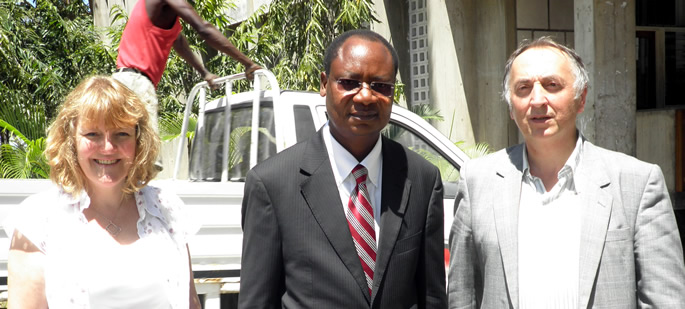University of Dar es Salaam 50th anniversary celebration
Mike Osborne and Lesley Doyle, during a recent visit to the University of Dar es Salaam, had the very great pleasure of attending the inaugural event of the university's 50th anniversary celebration. Here they are pictured with the Vice-Chancellor, Prof. Rwekaza S. Mukandala.

Their visit also allowed them to observe the work of their two doctoral students, both academics at the University of Dar es Salaam, Amina Kamando and Mpoki Mwaikokesya. Their work relates to that of PASCAL very closely and will be profiled soon.
 Printer-friendly version
Printer-friendly version- Login to post comments
- 71 reads








Comments
Topics of Theses
Here are the details of the two PhD projects that were previously mentioned.
Mpoki Mwaikokesya
Undergraduate students’ Development of Lifelong learning Attributes in Tanzania
This study aims at examining the individual and institutional practices that influence university students’ capacity to engage and persist as learners during their lifetime in Tanzania. In recent years, a need to develop a culture of self direction in learning and an ability for continuous learning has been considered to be a central aspect of educational systems in most countries. Universities have in particular been identified as important places where students can be helped to promote their abilities for self-direction in learning and to keep on learning. However, in a Tanzanian context, less is known about the processes through which students in universities can develop such abilities. This study is conducted to fill this gap. The findings of the study may inform and influence university teaching and learning processes, and policies.
Amina N. Kamando
An Exploration of the Nature and Extent of Government-Community Partnership in the Provision of Education in Tanzania
The main focus of this study is local communities (mostly located in rural areas) interested in the nature and experiences of working in partnership, by identifying patterns of social relations and indicators of internal community cohesion that promote social action as well as challenges this partnership face, successes and failures. It will suggest ways forward for an optimal partnership in the light of the local communities’ understanding and experiences. This study relies on the theories of social capital and social networks, which consider the social relationships, networks, trustworthiness, mutual responsibility and commitment, and norms of reciprocity as vital resources in the social structure. This study employs a qualitative research approach using multiple-case study design. This approach favours the use of multiple source of evidence for data gathering, which include semi-structured interviews, focus group discussions, observations and documentary review.